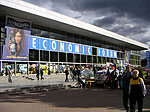Discussing Ukraine’s future development
Twenty-eight experts and officials from Ukraine, NATO, and other European countries and international organizations recently led a number of panel discussions on key issues concerning Ukraine’s future development at the 18th Economic Forum, held 10-12 September 2008 in Krynica, Poland. Over five hundred leading European experts, officials, and politicians participated in these discussions on issues related to Ukraine’s Euro-Atlantic integration and related reforms.
Two high-level panels brought senior officials and parliamentarians into discussions on the impact of Ukraine’s Euro-Atlantic Integration on Central Europe’s development and on the continuing evolution of NATO after Bucharest. Six expert panels addressed a broad spectrum of issues: building Ukraine’s economic prosperity, transforming government ethos, transforming national security and defence, more effective foreign policy, energy security, and defence industry’s Euro-Atlantic future. Assistant Security General for Defence Policy and Planning, Ambassador Jiri Sedivy, linked these reforms to the Forum’s main Focus on Central Europe through his participation, together with former President Lech Walesa, in plenary session that addressed the question: “Where is the Heart of Europe?”
These discussions at the Krynica Economic Forum were organized in the framework of the Partnership Network for Civil Society Expertise Development. This initiative – launched in 2006 under the auspices of the NATO-Ukraine Joint Working Group on Defence Reform – aims to strengthen civil society’s role in defence and security affairs through discussion, networking, and sharing experience.
Key issues
Economic prosperity. The architects of successful Estonian and Slovak economic reforms, former Estonian Prime Minister Mart Laar and former Finance Minister Ivan Miklos, joined representatives from the International Monetary Fund and the NATO Economics Directorate to discuss with Ukrainian parliamentarians and experts the extent to which the lessons of Central European economic development could apply to Ukraine. Panellists generally agreed that Ukraine could benefit from addressing a number of issues – such as structural adjustments, deregulation, and combating corruption – that had been essential for Central European reform. However, these reforms would need to be tailored to Ukraine’s specific needs.
Defence Industry. Industry leaders with experience in joint projects joined officials and parliamentarians to discuss the potential for Ukraine’s defence industry to partner with European or North American firms. Discussion of already-existing cooperation showed that considerable potential exists, but that this also faces a number of barriers. More work needs to be done in building understanding and contacts between industry representatives. In addition, government action could help improve the legal environment to support cooperation.
Democratic Governance. Democratic transitions are about more than elections; they call for a dramatic transformation of the relationship between the leadership of the state and its citizens. Panellists agreed that while much had been done to build a democratic Ukraine, the challenge today is to build state institutions appropriate to a democracy and develop political culture of consensus and compromise.
National Security Transformation. Ukraine’s national security and defence sector is frequently cited as a positive example of Euro-Atlantic reforms. Panellists agreed that the defence ministry continued to set an example of reform within the security sector, although some other institutions, such as the Security Service, had accelerated efforts over the past few years. Yet considerable challenges remain, including ineffective institutions, Soviet-era practices, poor inter-ministerial coordination, and endemic corruption. This required continued focus on democratization, as well as on transformation to meet new security challenges.
